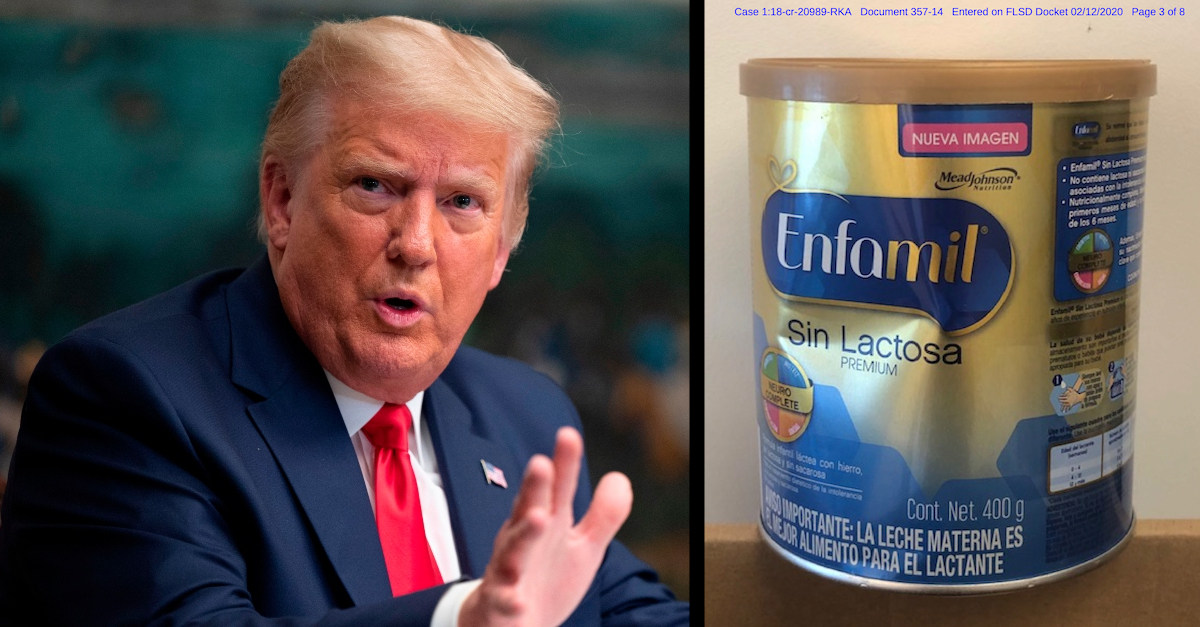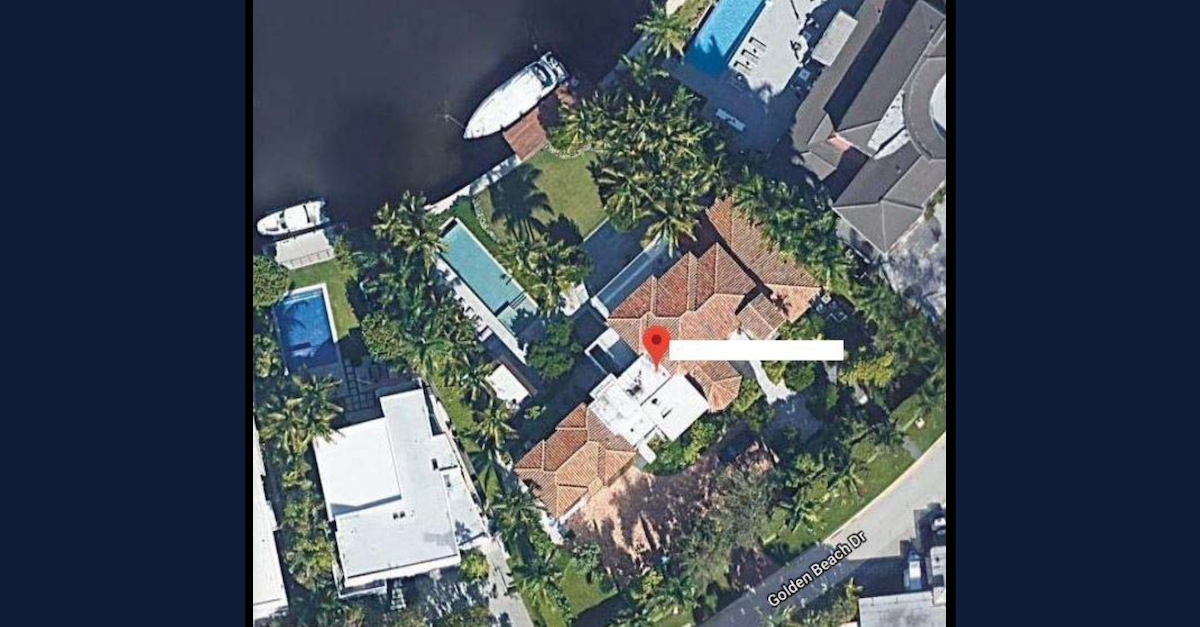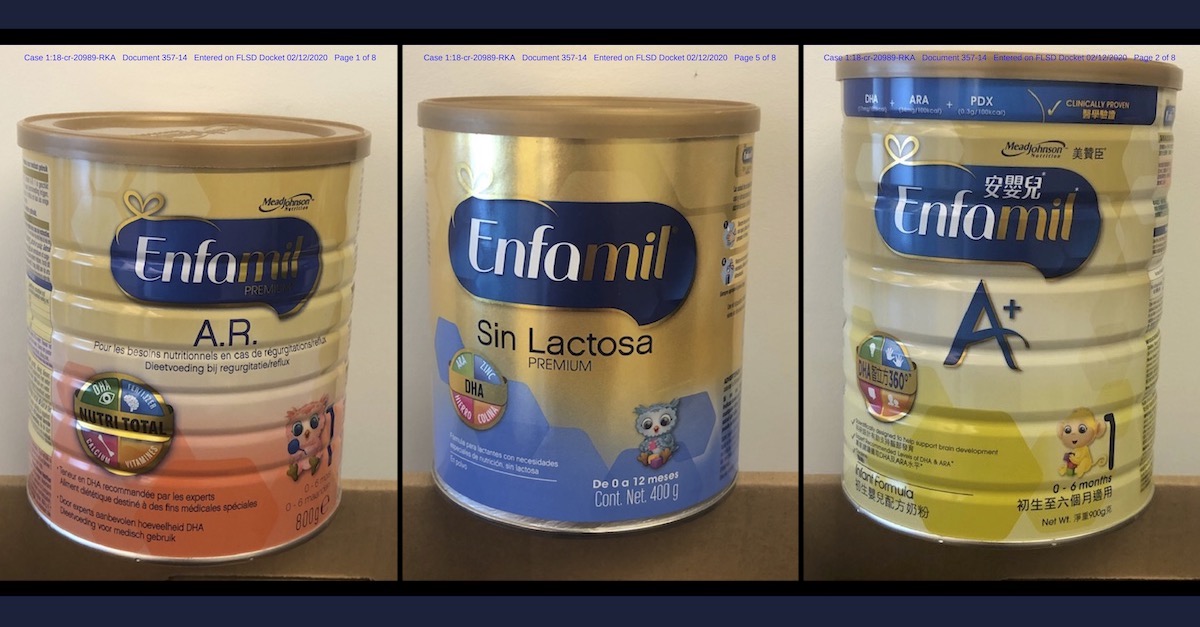
Three Florida residents are headed to prison for the next 18 years in what federal prosecutors described as a $100 million fraud scheme that involved “cheat[ing] U.S. manufacturers of infant formula, eye-care products, and other FDA-regulated items.”
Johnny Grobman, 48, Raoul Doekhie, 53, and Sherida Nabi, 57, all of whom are described as being from South Florida, “secured deep price discounts for infant formula and other items by lying to the U.S. manufacturers of the products,” the U.S. Department of Justice said in a press release. Each profited into the tens of millions of dollars, the DOJ said.
The scheme, which lasted from 2013 to 2018, involved assertions that the defendants were shipping the products to a country on the coast of South America, the DOJ wrote. The feds explained that the case involved the so-called “gray market” — which is “the diversion and re-sale of certain goods that were not intended for distribution in the United States.”
Here is how they said the scheme played out:
Doekhie and Nabi (who are married) told the manufacturers that they were purchasing the products to ship overseas, to Suriname, often in connection with purported government procurement contracts they held in Suriname. In fact, the defendants did not have government procurement contracts and never intended to export the products to Suriname. Instead, Grobman and others sold the products in the United States for millions of dollars, which the three defendants later split among themselves.
The defendants hid their activity from the U.S. manufacturers of the FDA-regulated products in one of three ways. The first was to send “dummy” shipments abroad. The dummy shipments did not contain the products purchased from the manufacturers, but they did generate documentation to prove that an export occurred. The second method was to “U-turn” the products: The products were shipped abroad, generating export documentation. As soon as they arrived overseas, they were shipped back to the United States. The third method was to create fraudulent export shipping documentation showing that the products were exported when they actually never left the country.
Prosecutors put the scheme bluntly in a sentencing memorandum reviewed by Law&Crime.
“For 12 years+, the Defendants worked hard at defrauding U.S. businesses both large and small,” the memo indicated. “The truth, in the form of an honest truck driver or a well-hidden GPS device, was their primary obstacle. And for 12 years+, they mostly succeeded.”
The sentencing memorandum said the scheme unraveled when, in 2017, “a small organic food company discovered the Defendants’ fraud after a carrier reported that goods intended for Suriname were instead being delivered to a U.S. customer’s warehouse.”
According to the sentencing memo, an email chain between two of the defendants indicated how tenuous — yet financially fruitful — the scheme really was.
“We have worked 12 years+ with minimal issues, we should be fortunate about it,” defendant Grobman allegedly said to defendant Nabi in an email cited by prosecutors in the sentencing request. “I understand every time we lose some line, it affects us all, but this is out of control, that a driver talks, these are the kind of morons that elected our current president.”
A government exhibit list suggests the message was sent on Feb. 13, 2017. That means it appears to have been dated just weeks into Donald Trump’s presidency. Trump assumed office on Jan. 20, 2017.
In the sentencing memo, prosecutors rubbished the extravagant lifestyle the defendants subsequently led and pointed to Google photos of a “a $9 million waterfront home in Golden Beach, a three-bedroom condominium on Las Olas, another three-bedroom condominium in Rotterdam, luxury cars, private schools, international vacations, and the 48-foot yacht Grobman sold in June” as fruits of the scheme.

Prosecutors embedded this photo of Johnny Grobman’s mansion and yacht in an Oct. 19, 2020 sentencing memorandum.
“Doekhie previously admitted that his fraudulent company had a net worth of $28,000,000.00,” the feds also wrote in the sentencing memo. “This exorbitant wealth was not earned; it was swindled.”
A federal jury found the trio guilty of the following crimes on Feb. 6, 2020, after a 13-day trial: conspiring to commit wire fraud; wire fraud; money laundering; conspiring to obtain pre-retail medical products worth $5,000 or more by fraud or deception, theft of pre-retail medical products; and smuggling goods from the United States.
The government argued that the sophisticated nature of the crimes required a harsh sentence.
A judge previously ordered forfeitures of $87,187,374.83 against Grobman and $115,699,273.61 jointly against the Defendants Doekhie and Nabi, the DOJ said. The money can be collected against any “criminal proceeds traceable to the offenses.”
Additional restitution amounts remain up for debate and will be argued at a future hearing, the court docket indicates.

A series of government exhibit shows showed cans of baby formula relevant to the prosecution.
“The fraud perpetrated by these defendants is nothing short of egregious,” said U.S. Attorney Juan Antonio Gonzalez of the Southern District of Florida. “The 18-year prison sentences reflect the seriousness of the defendants’ crimes. Our Office will continue to vigorously prosecute those who commit these types of offenses.”
“Today’s announcement should serve as a reminder that those who fraudulently divert consumer products for profit will be held accountable for their actions,” said Justin C. Fielder, the Special Agent in Charge of the Miami Field Office of the FDA Office of Criminal Investigations. “We will continue to investigate and bring to justice those who engage in fraudulent schemes involving FDA-regulated products.”
The Broward County Sheriff’s Office assisted with the investigation, the feds added.
Not all of the trial transcripts or exhibits are publicly available on a federal court database. Some of the case file, including a superseding indictment, a few evidence photos, and the aforementioned government sentencing memorandum, is below:
[Image of Trump via Andrew Caballero-Reynolds/AFP/Getty Images; image of infant formula via a government trial exhibit.]